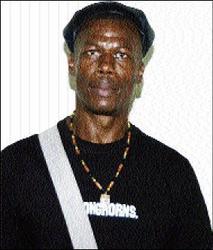Paul H. Williams, Gleaner Writer

When ex-policeman Charles Brown left Jamaica in the mid-1980s for the United States, on a one-year visa, he had no idea that he would be there for 19 years, uprooted and unceremoniously returned to the land of his birth. After being given an honorary discharge from the United States Army, he went back to school, qualified himself as a computer engineer, and led the good life. But, a brawl in 1995 set in motion a series of events that formed the basis of his return to Jamaica nine years later.
One night, while he was at a club, an argument developed between him and his girlfriend's ex-husband, Sloan. Some amount of shoving took place and the man drew his gun. Charles backed off, and subsequently left the scene. Yet, it wasn't over.
"My babymother said, 'Let's go to the house, Charlie.' So we went to the house," Charles says. "By the time we got to the house, a guy called me and said, 'Yow Soljie, yuh nuh know seh some man deal wid him case ... Dem beat him up ....' He went to the police and told them I did it, so they went to the school (where Charles worked), and arrested me."
He was charged for aggravated battery - a felonious offence, which is a more serious act than a misdemeanour. After a year of refusing to say who had actually battered his girlfriend's ex-husband, he pleaded 'no contest'.
"I wasn't willing (to say who did it). Because that would be an unethical thing to do in my community and within myself, so I got stuck with the charge," Charles explains.
He was put on probation for two years, and ordered to make restitution in the form of paying Sloan's medical bills. At the end of the two years, the payments were not complete. Thus, his probation was extended to three more years, going into 2000. One night, in July, as he was heading home in his Lexus, the story of his life started a new chapter.
Tagged by cops
"I am driving my car coming from the store. A police officer drove behind me. I could see him on his radio, which means he ran my tag. He turned into the police station ... and I continued home," he says. "By the time I went into a place called the park, I saw a police officer sitting right there."
The officer tailed him until Charles pulled up into a friend's driveway, and parked. He got out and the officer said to him, "Hey, you want to hold it right there for a minute!" Charles enquired whether he was under arrest. The officer said no, and Charles told him he didn't want to speak with him, and went straight to his residence.
When he went to get his car later that morning, it was missing, so he went to the police department. They had impounded it. And that was not all.
"Prior to going off duty at 6:00 a.m., Officer Huften left an arrest affidavit (warrant), signed by himself and witnessed by Officer Lister with instructions to arrest one 'Charlie Brown' if he showed up at the station.
"The instructions and arrest affidavit were given to Officer Jamie Davidson, the relieving officer. About 10:00 a.m., upon the instruction of Officer Huften, I was arrested by Officer Davidson of the Avon Park Police Department and charged for the offence of resisting arrest without violence (a misdemeanour). I was released on bond." But his freedom was short-lived.
End of days in US

Charles Brown - Junior Dowie/Staff Photographer
A few days after, he was at home preparing food for a get-together when he got a call from the authorities to go to settle the outstanding amounts for the restitution of the medical expenses. He promptly left with the money, without realising that that moment was the beginning of the end of his days in the United States.
Charles: "I was taken into custody by the Florida Department of Corrections for a possible violation, in case number CF95-0602 (aggravated battery), of my five years' probation ... I was held without a bond, pending the outcome of the charges. The arrest report and charging affidavit were delivered to the Office of the State Attorney on July 20, 2000, for a ruling.
Unlawful conviction
"I was not charged by an information according to law. Instead, I made five appearances in the County Court between August 2000 and January 4, 2001, when I was charged by information, one day before a trial by jury.
"Under oath, Officer Huften stated that he was in a marked police vehicle about 2:00 a.m. on July 20, 2000, when he made a traffic stop on a Lexus for a violation of section 316.605. Upon the vehicle stopping, the driver fled the scene and was not located. A call for back-up from Officer Jason Lister was useless, because the driver of the vehicle was not located.
"Radio checks revealed that the vehicle was not stolen; the tag, driver's licence, and proof of insurance were valid. There was no outstanding warrant and no contraband found in the vehicle. However, it was impounded by Officer Lister. On January 5, 2001, a jury panel returned a guilty verdict and I was sentenced to nine months (including time served) in the county jail."
As a result of the misdemeanour conviction, his probation for the felony of aggravated battery was revoked, and he was sentenced to 46 months for violating his probation. He has since been claiming that the misdemeanour conviction was in conflict with existing applicable laws and statutes of Florida. Yet, the 10th Judicial Circuit and the Second District Court of Appeal upheld the conviction. An appeal to the Florida Supreme Court was not granted.
Failed appeal
The issues surrounding the legality of the resisting arrest charge are very complex, and Charles has been very strident in his efforts to get that conviction and, by extension, the breach of probation charges overturned. Many letters have been written, and several discussions, legal and otherwise, have ensued, but he has failed in his bid, so far. His bone of contention is that the resisting arrest charge was trumped up since there was no attempt to arrest him, and for the police to arrest him in the first place, there had to be a violation. He said there was none.
According to Charles, Florida Rules of Criminal Procedures require that, "in a prosecution for the offence of resisting arrest without violence, a misdemeanour, and a violation of Section 843.02 (Florida Statutes 2000) as amended, the legality of an arrest is the essential element of the charge of resisting arrest without violence, and the prosecution has the burden of establishing such element." Thus, "if the arrest is unlawful, the prosecution must fail, and a conviction cannot stand as a matter of law."
After two years into his nearly four-year sentence, he was taken into custody by the United States Immigration and Naturalisation Services, and was subsequently ordered deported to Jamaica. On January 24, 2004, Charles, accompanied by U.S. Marshals, was returned to the country. It is nearly four years now, and what has become of him? Find out next week, as he continues to tell his story.
paul.williams@gleanerjm.com

